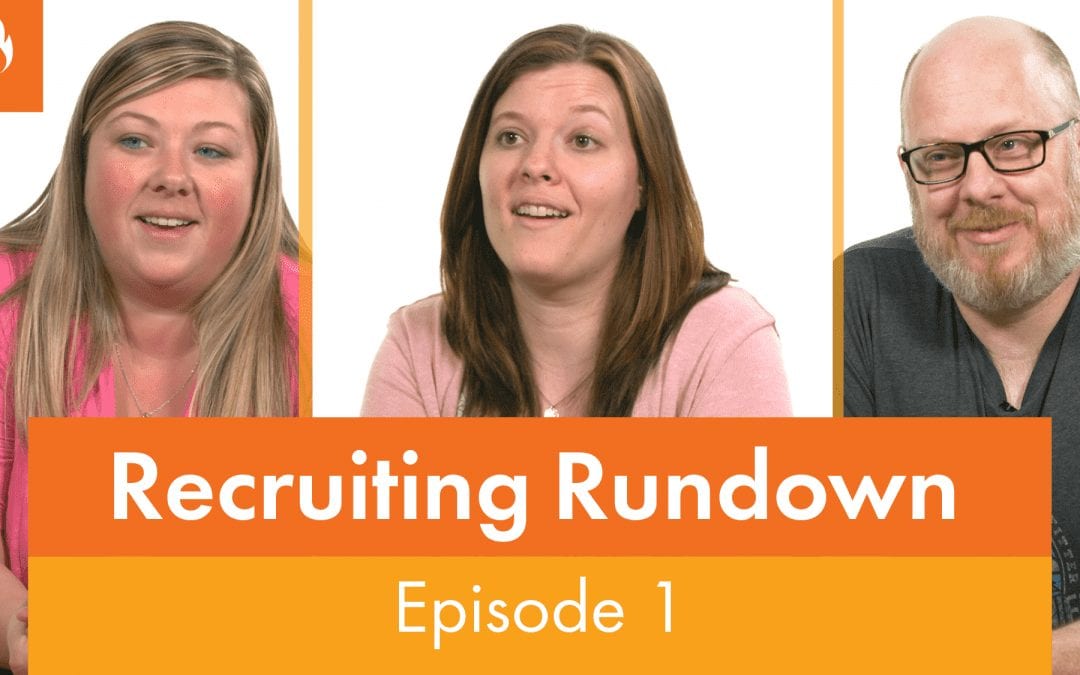
Season 3, Episode 1:
Millennials: Can’t Recruit with ’em, Can’t Recruit Without ’em
To help us better understand what makes millennials tick, we asked each recruiter 5 questions specific to their experiences recruiting millennial candidates.
1. What drives millennials the most in their careers?
Robin and Melissa agreed that compensation is a key driver. However, Scott sang a different tune: “I think a lot of [millennials] are driven by the work that they get to do and the potential for growth. There’s always a small percentage of people, regardless of what generation they fall in… that are compensation-motivated… but I haven’t found that with millennials.”
Company culture and work-life balance also made it to the top of the list. “[Millennials] work to live rather than live to work,” explains Robin. “They want a job that understands that they have a life outside of work.”
Takeaway: When interviewing a millennial candidate, try to highlight compensation, work-life balance, company culture, and the potential for growth.
2. What’s the best way to get in contact with millennial candidates?
Scott, Robin, and Melissa all stand by LinkedIn and email as solid platforms for outreach. But, when Melissa and Scott started reaching out via text, they saw an increase in responses. “As we get further and further along… recruiters are going to have to get better at learning how to text information to candidates.”
Takeaway: Times are a changin’. Phone calls are phasing out. Texting millennial candidates will trump other methods of communication moving forward, but LinkedIn and email are here to stay.
3. How do you feel about the job hopping millennial stereotype?
The hubbub about the millennial job-hopping stereotype comes up a lot in recruiting. Surprisingly, Robin, Melissa, and Scott agreed that it was bogus.
Melissa and Robin passionately defended millennials, explaining that we no longer live in a world where folks graduate high school and stay at the same company for 30-years. Robin rightfully stated that “To progress in your career, sometimes it’s necessary to leave companies to gain that promotion somewhere else.”
Robin explains “…As long as [candidates] can improve on [their] skills at every job [they’ve] been to and moved up the ladder, I would say being a job hopper… leaving a job every 2-years is OK… as long as [candidates] can speak to that [they’re] growing.”
According to Scott, the biggest red flag is when “…it looks like they were leaving solely because they were trying to get away from a certain manager or a certain situation and that pattern repeats itself… then that may be that the issue is them and not the company.”
Takeaway: The job-hopping stereotype should die off. Never pass on candidates just because their resume shows short stints at different companies. More often than not, candidates have valid reasons why they leave roles. Of course, there are always exceptions. But are those reasons directly correlated to a specific generation? Absolutely not.
4. Do you approach millennial candidates differently than a candidate in another generation?
The general consensus: recruiters should always approach candidates the same way regardless of generational differences. The not-so-secret sauce? Be polite. Be kind. Melissa added that “…it’s really just about finding out what the person’s motivators are. It doesn’t matter if they’re a millennial or if they’ve been in the industry for 20 plus years… as long as you find that out, people are generally the same.”
Robin’s overall approach varies depending on the position rather than the generation. The only notable difference is how individuals respond to her outreach. Scott stressed the importance of maintaining the same mindset. “You don’t want to go into any conversations or interviews with anyone with predispositions.”
Takeaway: Recruiters’ approach to millennial candidates should always be the same across the board. Be kind, polite, and have a genuine interest in their motivations for a new role and them as people. Starting an interview with any sort of bias is a surefire route to sabotage.
5. How do millennial candidates respond to feedback or constructive criticism?
Melissa maintained that the style for giving feedback isn’t necessarily different, but that millennials’ are a little more curious: “If [millennials] didn’t get the position, they wanted to know the ‘why’ behind it and a lot of times what they could do better. Whereas more tenured people, they would just say ‘OK, thank you.’”
Robin and Scott’s experiences, on the other hand, are vastly different from Melissa’s. Robin has found that responses to feedback vary, but overall, “I think millennials do take constructive criticism a little more to heart than other generations.”
Scott couldn’t speak to millennial candidates per se, but he did manage a team of recruiters that were 75% millennials. During meetings, for example, there were instances where millennial team members interpreted his feedback as ‘calling them out’ in front of their buddies. He goes on to explain that, “I would have taken it more as me just asking questions about the work that they were doing and holding them accountable.”
Takeaway: Some millennial candidates have a tough time receiving feedback, even if they ask for it. Others take it more seriously and use it as a tool for improvement. While recruiters can’t always adapt their approach to feedback, it’s important to keep these differences in mind and approach the subject carefully.
About Recruiter Fuel
Recruiter Fuel is a weekly video series dedicated to all-things recruiting and talent acquisition. Learn More our mission and how you can submit a topic, be featured in an episode, or nominate an expert to guest star on an upcoming episode.
Visit the Recruiter Fuel series directory for more content.





